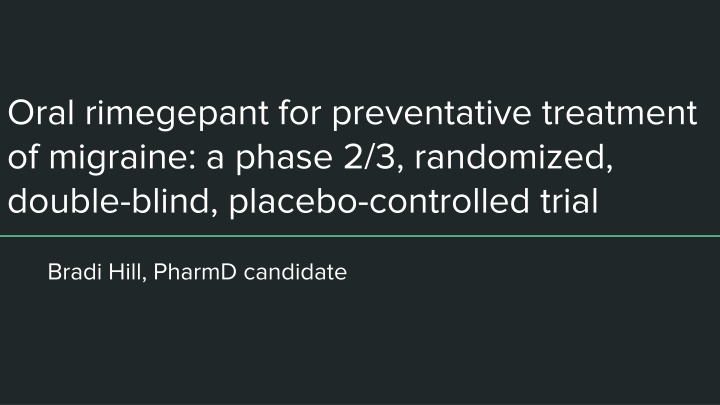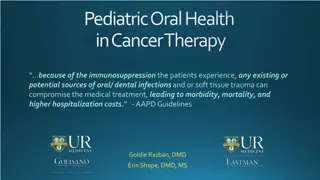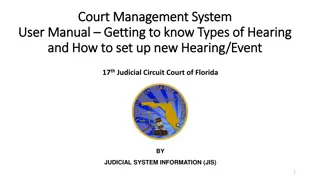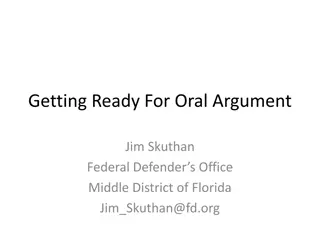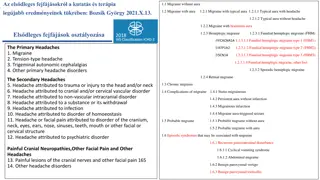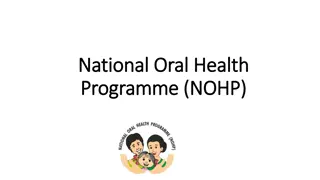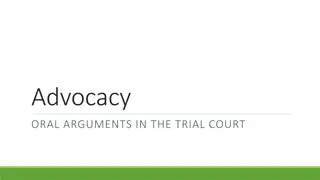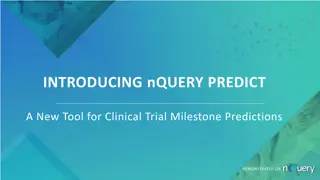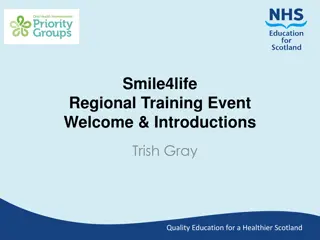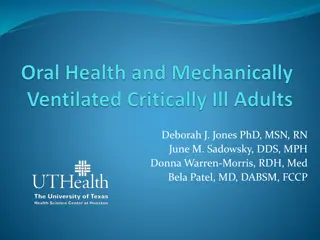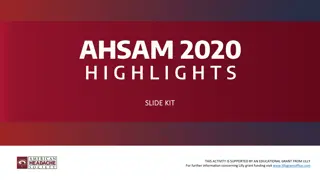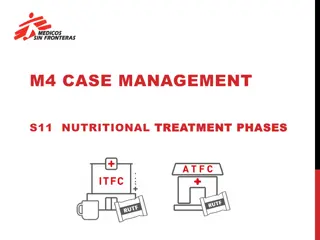Oral Rimegepant for Preventative Treatment of Migraines: Phase 2/3 Trial
More than 1 billion people worldwide suffer from migraines, a condition more prevalent in women. This study evaluates the efficacy, safety, and tolerability of rimegepant in preventing migraine attacks through a randomized, double-blind, placebo-controlled trial. Rimegepant targets Calcitonin Gene-Related Peptide receptors, crucial in migraine pathophysiology. The study design includes a double-blind treatment phase, open-label extension phase, and observation/screening phase. Participants took rimegepant or placebo every other day and recorded migraine data in electronic and paper diaries. Interventions also allowed the use of rescue medications if needed.
Download Presentation

Please find below an Image/Link to download the presentation.
The content on the website is provided AS IS for your information and personal use only. It may not be sold, licensed, or shared on other websites without obtaining consent from the author.If you encounter any issues during the download, it is possible that the publisher has removed the file from their server.
You are allowed to download the files provided on this website for personal or commercial use, subject to the condition that they are used lawfully. All files are the property of their respective owners.
The content on the website is provided AS IS for your information and personal use only. It may not be sold, licensed, or shared on other websites without obtaining consent from the author.
E N D
Presentation Transcript
Oral rimegepant for preventative treatment of migraine: a phase 2/3, randomized, double-blind, placebo-controlled trial Bradi Hill, PharmD candidate
Background More than 1 billion people worldwide suffer from migraines Recurrent attacks of headaches that are typically associated with any or all of the following: photophobia, phonophobia, visual disturbances (aura), nausea, vomiting Much more prevalent in women than in men Pharmacotherapy consists of acute treatment and preventative treatment Acute Treatments Preventative medications NSAIDs Acetaminophen Triptans Antiemetics Beta blockers Tricyclic antidepressants Anticonvulsants Injectable CGRP antagonists or monoclonal antibodies
Role of Calcitonin Gene-Related Peptide in Migraine Calcitonin Gene-Related Peptide receptors are located within the pain- signaling pathways, and activation of them seem to play a causal role in the pathophysiology of migraines Rimegepant (Nurtec) was originally approved for the acute treatment of migraine This study aimed to compare the efficacy, safety, and tolerability of rimegepant taken every other day, with placebo for the preventative treatment of migraines
Study Design Double-blind Treatment Phase Open-label Extension Phase Observation/Screening Phase 4 week observation period to collect baseline data and determine eligibility of patients 12 week period Patients received study drug or identical placebo to take every other day Patients returned to study site at weeks 2, 4, 8, and 12 for assessment Patients who completed the 12 week double-blind treatment phase were assessed for entry into a 52- week open-label extension phase
Interventions Rimegepant 75mg tablet or placebo tablet to be taken every other day Electronic diary was used to document occurrence and severity of migraine attacks, paper diary was used to document use of migraine treatments Participants were permitted to use rescue medications including triptans, NSAIDs, acetaminophen, antiemetics, and muscle relaxants as needed Participants were also able to take one preventative migraine medication (excluding CGRP antagonists and CGRP monoclonal antibodies) if the dose was stable for at least 3 months before the 4-week observation period, and did not change during the study
Outcomes Primary Change from 4-week observation period in the mean number of migraine days per month in the last 4 weeks of the double-blind treatment phase (weeks 9-12) Secondary Achievement of at least a 50% reduction from the 4-week observation period in the mean number of moderate or severe migraine days per month in the last 4 weeks of the double-blind treatment phase (weeks 9-12) Change from the 4-week observation period in the mean number of migraine days per month across the whole double-blind treatment phase (weeks 1-12) Mean number of rescue medication days per month in the last 4 weeks of the double-blind treatment phase (weeks 9-12) Change from the 4-week observation period in the mean number of migraine days per month in the first 4 weeks of the double-blind treatment phase (weeks 1-4) Adverse events were also monitored for safety and tolerability
Study Population Inclusion Criteria Exclusion Criteria 18 years of age and older At least a 1-year history of migraine (with or without aura) Initial presentation of migraine before 50 years of age Between 4 and 18 migraine attacks of moderate or severe intensity per month over the 3-month period before screening At least 6 migraine days during the 4-week observation period Uncontrolled co-morbid conditions History of, treatment for, or evidence of alcohol or drug abuse in the last 12 months History of any chronic pain syndromes that may interfere with the study History of opioid or barbiturate use for 4 or more days per month during the 3 months prior to screening visit Irregular ECG or laboratory findings Non-compliance or inability to complete eDiary during observation period
Randomization Interactive web-based randomization tool was used to randomize patients (1:1) to either rimegepant 75mg or identical placebo pills Randomization was stratified by whether or not participants were on other preventative migraine medications
Statistical Analysis Generalized linear mixed-effect model was used to measure change from baseline Useful when there is a data set with more than one source of random variability Results were reported using least squares mean Means are adjusted for other factors Secondary outcomes were analyzed in a hierarchical nature to avoid type 1 statistical error
Results Safety Endpoints Participants who received rimegepant and placebo were equally likely to have an adverse event 133 participants (36%) in each group experienced an adverse event 40 participants (11%) in rimegepant group and 32 (9%) in placebo group experienced an adverse event that investigators considered to be related to study treatment Nearly all adverse events were mild or moderate Rate of discontinuation due to adverse effects was low in both groups
Discussion Strengths Limitations Study population representative of adults with migraine Patients with both chronic and episodic migraine were included Statistical analyses were appropriate for the data being assessed Exclusion of patients with more than 18 headache days during the observation period Relatively short duration No active comparator Subjectivity with patient self -reporting
Conclusions Authors concluded that orally administered rimegepant 75mg dosed every other day is effective as a preventative treatment for migraines FDA approval has since been updated to include the prevention of migraines While the outcomes of the primary endpoint were statistically significant, a 0.8 day advantage over placebo may not be clinically significant Due to mild side effect profile rimegepant may be a good preventative option for patients that do not tolerate traditional preventative therapies, or for those who do not want an injectable medication Shorter half-life provides patients and providers with greater flexibility than the injectable CGRP antagonists or monoclonal antibodies
References 1. Croop R, Lipton RB, Kudrow D, et al. Oral rimegepant for preventive treatment of migraine: A phase 2/3, randomised, double-blind, placebo-controlled trial. The Lancet. 2021;397(10268):51-60. doi:10.1016/s0140- 6736(20)32544-7 Pathophysiology, clinical manifestations, and diagnosis of migraine in adults. Uptodate. https://www.uptodate.com/contents/pathophysiology-clinical-manifestations-and-diagnosis-of-migraine-in- adults?search=migraine+prevention+treatment&topicRef=3345&source=see_link#H21673885. Accessed August 14, 2021. Preventive treatment of episodic migraine in adults. Uptodate. https://www.uptodate.com/contents/preventive- treatment-of-episodic-migraine-in- adults?search=migraine+prevention&source=search_result&selectedTitle=1~82&usage_type=default&display_rank =1. Accessed August 15, 2021. NURTEC (Rimegepant) [package insert]. New Haven, CT; Biohaven; Revised May, 2021. Croop R, Lipton RB, Kudrow D, et al. Oral rimegepant for preventive treatment of migraine: A phase 2/3, randomised, double-blind, placebo-controlled trial. [supplemental appendix]The Lancet. 2021;397(10268):51-60. doi:10.1016/s0140-6736(20)32544-7 2. 3. 4. 5.
